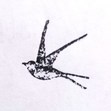Names and Power
Sometimes you can get a lot out of a single word.
Or you can pack a lot into a single word, I suppose – it depends which way you’re approaching it. This is probably most evident in names, and especially in fantasy and sci-fi. When you need to append qualities to things – people, magical items, places – it always feels good to be able to get it all wrapped up in a suitable name. Maybe it’ll only reflect some qualities, maybe all of them. Maybe it’ll deliberately not reflect them. And sometimes the name or word you choose at random can end up having more meaning than you ever intended.
Let’s look at place names, and let’s look at mine. We have, in the Boiling Seas, the town of Port Malice. It’s a nice catchy name, and it has some implications. In-universe, was that always its name? (Yes.) Why name your own home something like ‘Malice’? Maybe because you’ve managed to stake a claim and scrape out a living in an inherently hostile environment, say, a boiling-hot ocean full of metal sea monsters. Maybe you call your own town ‘Malice’ out of spite and defiance at the world around you. Or maybe you’re an author only fully thinking about this name in book 3 of a trilogy, and finding serendipitous meaning in a word you picked to imply (well, basically outright state) to the reader that all is not necessarily well in this little port city.
Or Whetstone, the village where Perce lives in The Fire Within. (Or indeed Quern from The Singer, which is a type of grindstone/millstone, and definitely not hastily chosen to replace Whetstone because I forgot that I’d already used that as a town name.) A whetstone is a tool, and a tool that requires not insignificant effort to use, at that. It gives, deliberately, the impression of hard work to the reader: that the people who live in a village named for a tool are themselves going to be practical, useful, hard-working. And so the respective denizens of Whetstone and Quern are. They make their living from the land itself, two bunches of simple, practical people. Did they choose the name to fit themselves, or did the name shape them?
Names have power, after all. It’s a common trope in fantasy, to lesser and greater extents. Sometimes names have literal power over the people who have them, as in the Inheritance or Bartimaeus books – sometimes it’s more figurative, as in the classic epics like The Lord of the Rings.
When it comes to characters you often end up with titles doing the work, rather than literal names. It’s hard to take Mr Johann Goodwithasword seriously, even if he is good with a sword. But Johann of the Steel? That’s a nice succinct eponym. And the best titles, as with the best place and item names, are succinct. If you have to literally spell out that a character is the Warden of the Seven Hells, Slayer of Kings, Writer of Mediocre Love Poetry and Acceptable Gardener, it gets a bit boring. Unless, of course, you’re trying to depict an insufferable and/or arrogant bore, in which case it works rather nicely. If we look at history, you can contrast long strings of imperial Roman titles – Imperator Augustus Caesar Pontifex Maximus Romanus Eunt Domum, and all that – with the brutal simplicity of Erik the Red. I know which one of those blokes I’d rather have on my side in a scrap.
I try to tend towards the simple with my characters, though I do ignore that rule for effect. Lots of them have no titles at all; those who do develop nicknames I try to keep simple. The Blackbird, the Nightingale, all that jazz. Then you also have Sir Geoffrey du Babbage, always to be referred to by his full name by those who aren’t his friends thank you very much. But then he’s a bit of a nob, and deliberately so. But those single words can have so much more weight.
Blackbird. Quite clever, quite nimble, likes shiny things but a bit cheerier and less goth than ‘Raven’. In that case, I thought the nickname sounded cool, and worked backwards to get those traits into Tal Wenlock, its user.
And then in contrast, the sword I named last night for DnD. A magic blade, imbued with the power of a spell called Steel Wind Strike, letting the bearer strike swiftly, devastatingly and without warning. I thought this needed a name. So I did a little research, and found a hot wind, that blows down from the lee-side of a mountain to the floor below. If you’re in the lee you’re supposed to be shielded from the weather – you’re not expecting wind. And you’re certainly not expecting a warm wind to blow down from the Alps, where the word vaguely originates. A swift, unexpected wind, summarised in a single word: perfect for this Steel Wind sword.
Foehn. It’s not even a long single word. It even aspirates nicely, like the wind it describes. And to this English speaker it’s always nice to get a word with roots in another language for that extra exotic flavour.
Foehn. It’s a good sword name. I look forward to saying it. I hope that the sword ends up having as much power as the name. I reckon I can swing it.



